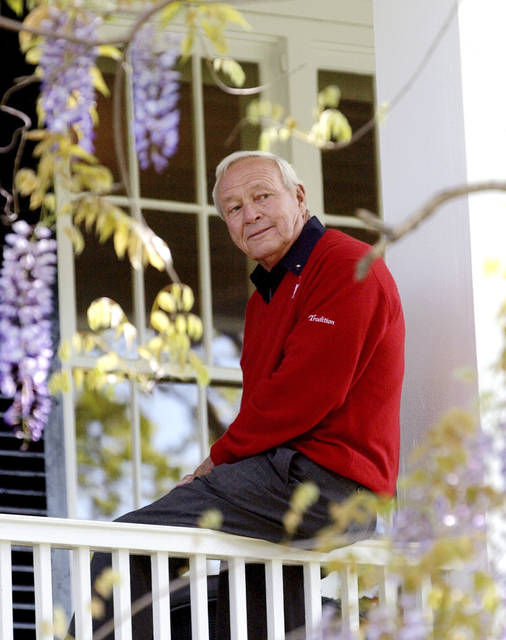AUGUSTA, Ga. — Even in poor health, Arnold Palmer made one last trip to Augusta National. ADVERTISING AUGUSTA, Ga. — Even in poor health, Arnold Palmer made one last trip to Augusta National. He was too feeble to swing a
AUGUSTA, Ga. — Even in poor health, Arnold Palmer made one last trip to Augusta National.
He was too feeble to swing a club, leaving Jack Nicklaus and Gary Player to handle the ceremonial opening tee shots. But Palmer donned a green jacket, flashed his crooked grin and gave everyone the familiar thumbs-up sign.
Less than six months later, he was gone.
Now, it’s time for the Masters to pay homage to the King.
In the first major championship since Palmer’s death last September , Augusta National is going all out to memorialize his impact on the club — where he won four of his seven career majors, eventually becoming a full-fledged member — and the free-swinging bravado that helped to popularize golf at the beginning of the television era.
There are little reminders all around the course, from Callaway bags adorned with pink headcovers — Palmer’s favorite shirt color — to Jordan Spieith mimicking that knock-kneed putting form for a tap-in at Amen Corner during a practice round.
When the tournament begins on Thursday, patrons will receive a commemorative badge honoring “Arnie’s Army” — the passionate fans who cheered him on by the thousands during his rise to greatness, mesmerized by the swashbuckling player from western Pennsylvania who always seemed like one of them, even as he accumulated unimaginable wealth and fame.
Billy Payne, the chairman of Augusta National, said it “will no doubt be an emotional goodbye, but at the same time, an even more powerful thank-you to the man we dearly love.”
Spieth reflected on Palmer’s surprise appearance at last year’s tournament , which turned out to be his Masters farewell.
“I thought it was incredible that he made the trip,” Spieth said. “I was taken aback when I heard he was going to be there, because he wasn’t in great health, but he kind of rebounded a bit around that time.”
As the 2015 champion, Spieth got to pick the menu for the annual dinner attended by past winners . Palmer was among them, which made the night even more poignant for the young Texan.
“I stepped back and did a lot of listening, other than what was required to tell him, ‘Hey, this is what you’re actually eating.’ There were some incredible stories told,” Spieth recalled. “It was a tremendous honor to have Mr. Palmer there, and it was certainly emotional.”
After his playing career ended, Palmer took over the honor of hitting the first tee shot at Augusta, still displaying that low, wind-milling swing even as the ball flew fewer and fewer yards. He was eventually joined by former rivals Nicklaus and Player, reconnecting a Big Three that combined to win 34 major championships.
For Nicklaus, it will be a bittersweet moment when he steps to the first tee just after sunrise without Palmer by his side.
“I don’t know how many people realize how much Arnold took me under his wing when I was 20, 22 years old,” Nicklaus said. “When I first started on the tour, Arnold was very good to me. … I may have had to fight Arnold’s gallery, but I never had to fight him. He was very kind to a young guy starting out. I appreciated it very much.”
Even though Nicklaus eventually surpassed Palmer, going on to win a record 18 major titles, the two became close friends. Their wives did, too.
Palmer passed along a few tips to his protege, lessons that Nicklaus carried with him the rest of his career.
“One of the things early on, maybe the first, second or third tournament I was in on the tour, I asked him, ‘What do you do after a round?’ He said, ‘I always drop the sponsor a note,’” Nicklaus said. “I don’t think I ever failed to drop a sponsor a note after a tournament, thank you for the tournament and thanking the people, the volunteers and so forth and so on.
“I’ve had a lot of sponsors come to me and say: ‘Jack, every year I get a letter from you. I don’t get one from anybody else.’ And that came from Arnold.”
For those watching the Masters at home or keeping up with it online, Palmer will have a huge presence. CBS and broadcast outlets around the world will have access to the club’s historical archives. The same goes for Augusta’s digital platforms and printed publications.
“We have encouraged them to showcase his accomplishments,” said Payne, adding that the club would also make a “significant contribution” to Palmer’s charitable foundation.
Payne first met Palmer at Augusta National even before becoming a member.
“Of course, I was completely in awe and he was so nice and so accepting of my embarrassing play,” Payne said. “I’m not sure I ever met a man who was more giving than Arnold Palmer. He had a profound influence on my life.”
He also had a profound influence on the Masters, which surged in popularity when Palmer ripped off a run of four victories in seven years beginning in 1958.
He’ll always be the King around this place.



